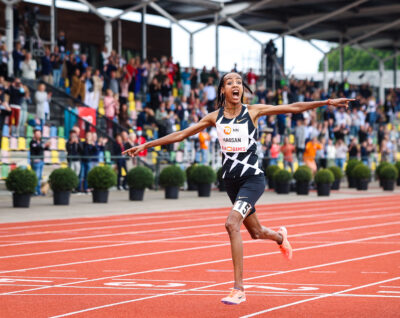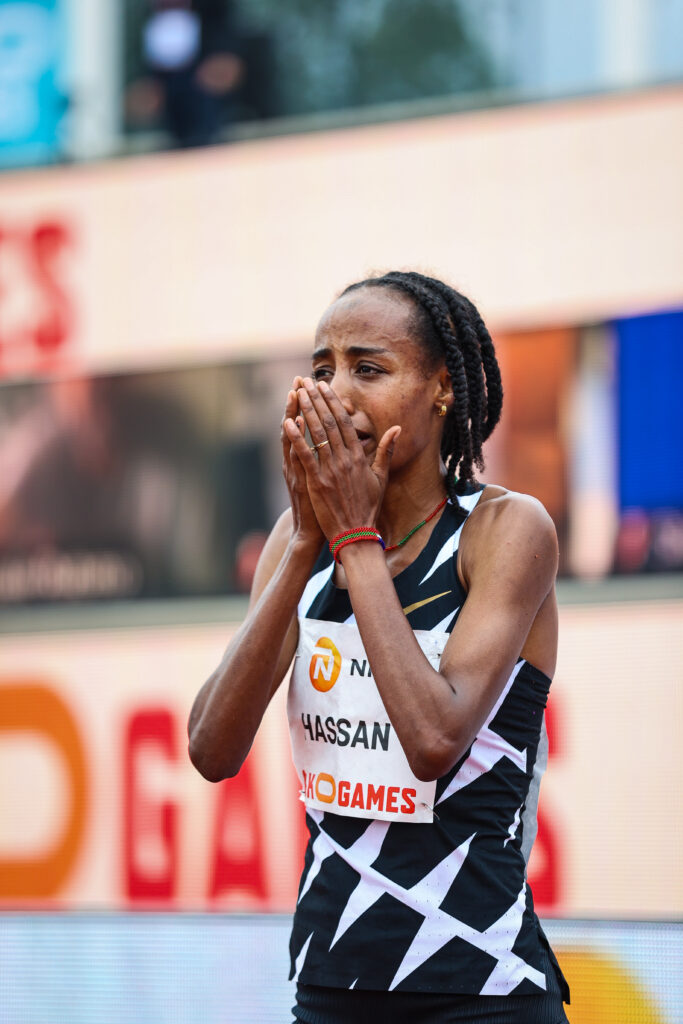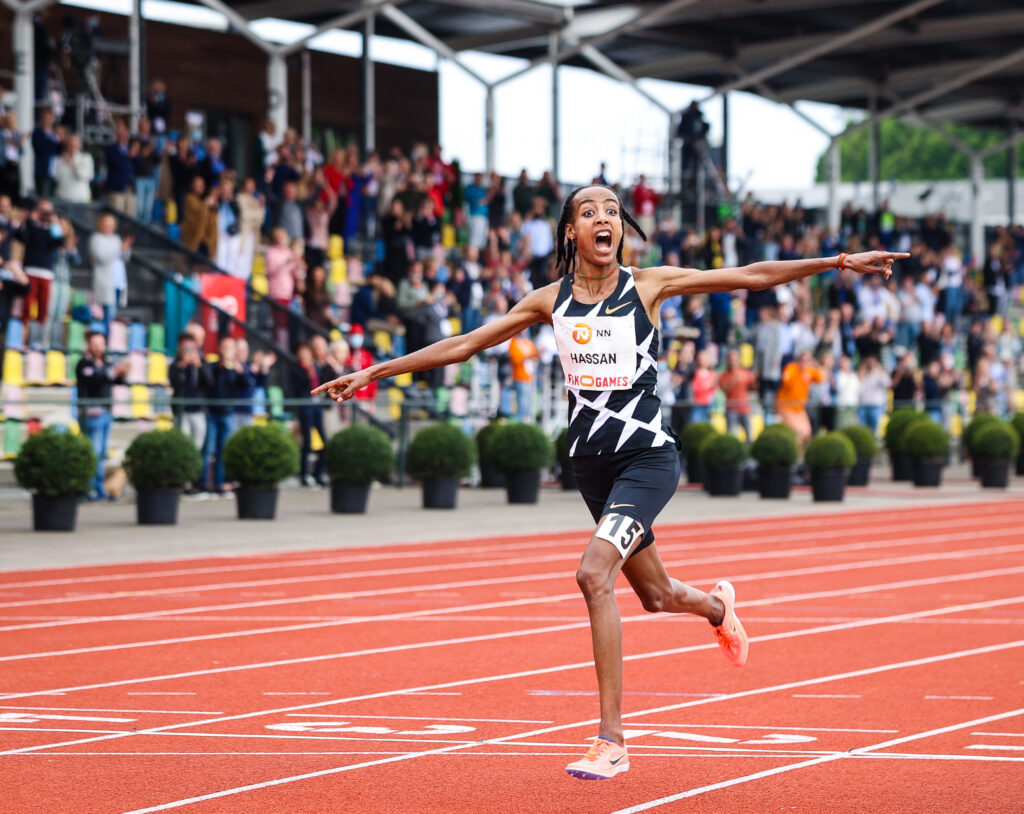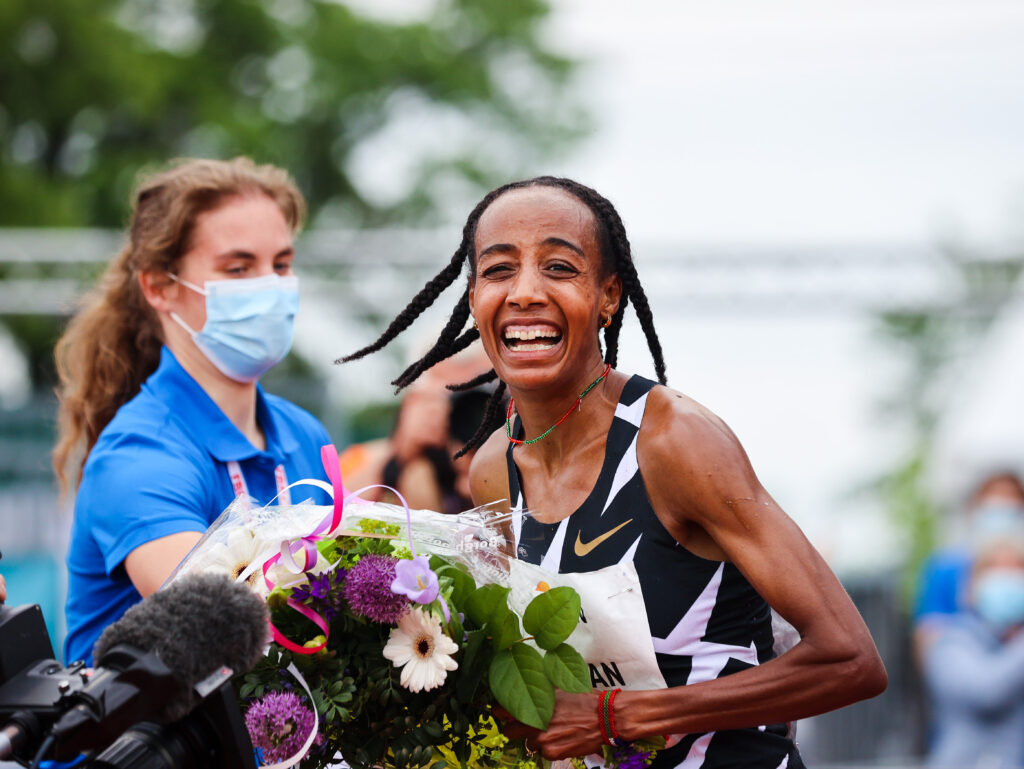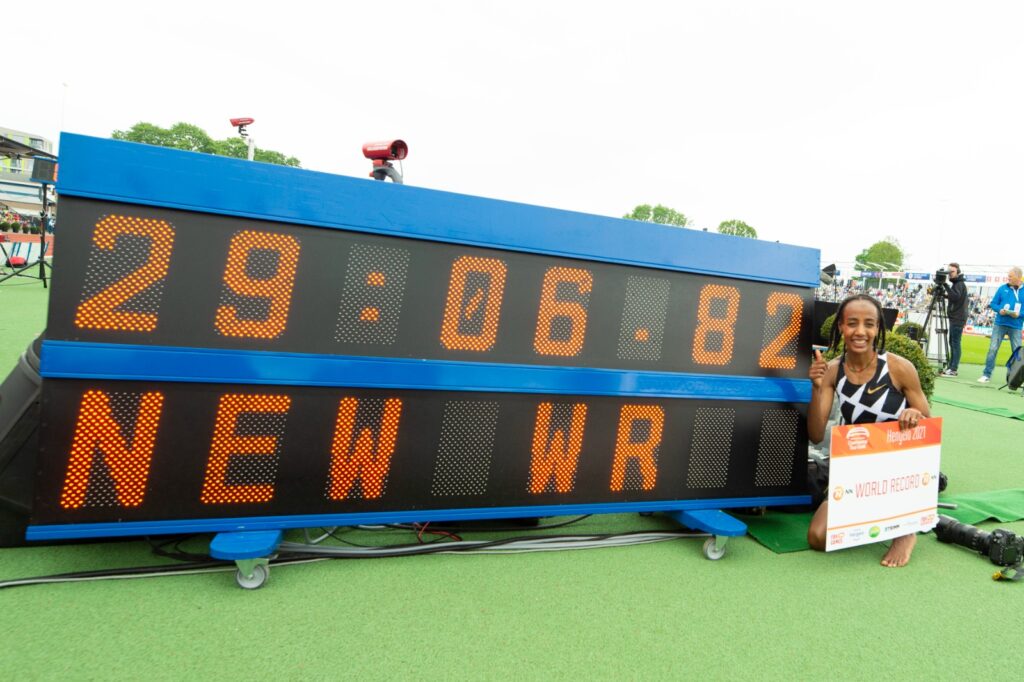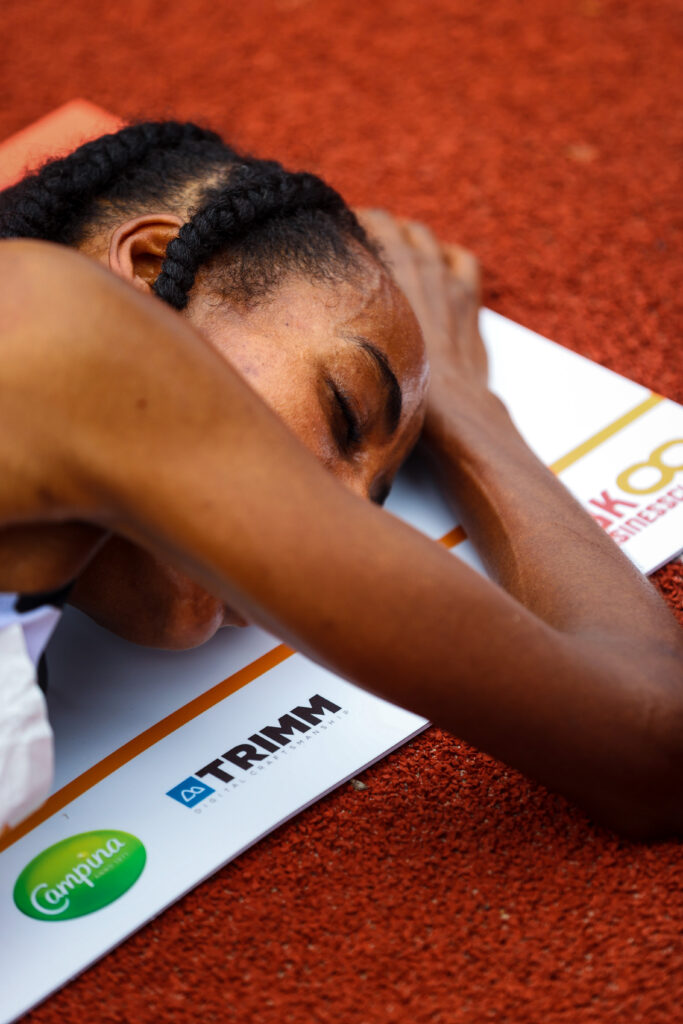Sifan Hassan Runs 29:06.82, Smashes 10,000 World Record at FBK Games
By Jonathan Gault
June 6, 2021
Running on the same Hengelo track where Haile Gebrselassie set his final 10,000-meter world record in 1998 and Kenenisa Bekele set his 5,000-meter world record in 2004, the Netherlands’ Sifan Hassan added her name to the legends of the sport by smashing the women’s 10,000-meter world record by running 29:06.82 on Sunday afternoon at the Fanny Blankers-Koen Games. Competing in front of a small home crowd in near-perfect conditions (63 degrees Fahrenheit and cloudy), Hassan dropped the pacemakers shortly after two kilometers. From there, she dutifully followed the pacing lights on the rail of the track through nine kilometers before ripping a 2:45.77 final kilometer to make history.
That blazing final kilometer accounted for almost all of the massive 10.63-second margin by which Hassan broke the previous record of 29:17.45, set by Ethiopia’s Almaz Ayana in the 2016 Olympic final.
Hassan went into the race with the world record in mind, with the pacemakers instructed to run 70-second laps (29:10 pace). But they did not last long at the furious tempo, and at 2100 meters, Hassan took over the lead. She would be on her own the rest of the way, churning out one 2:55 kilometer after the other, eyes fixed downward on the pacing lights to ensure she was on track. Hassan hit 5k in 14:38.75 looking strong, and by the final mile had lapped every other athlete in the field.
With Hassan still right on record pace at 9k (Hassan split 26:21.05, which is 29:16.72 pace), she finally let herself go over the final kilometer, unleashing a 2:45.77 split and 64-second last lap that proved there was much more in the tank. Had the pacing lights been set to 29:00 instead of 29:17 pace, there is little doubt Hassan would have become the first woman under 29 minutes today.
Throwing out her arms upon crossing the finish line, Hassan took a look at the clock and her expression was equal parts joy and disbelief. She grabbed the world record placard handed to her by an official and bent it over her head to buy herself some time to process the achievement while surrounded by dozens of cameras. When she finally discarded it, sitting on the track, repeated yelps of Oh my god were the only words that could escape her mouth.
After today’s race, Hassan unquestionably ranks among the all-time legends of the sport. She owns world records in the mile (4:12.33) and 10,000 meters (29:06.82) and two years ago in Doha authored the most stunning double in the history of women’s distance running, claiming world titles in both the 1500 and 10,000. Her range, with personal bests of 1:56 in the 800 up to a European record of 65:15 in the half marathon, is totally unprecedented. We have never seen a talent like hers.
The only question now is what event(s) Hassan chooses to run at this summer’s Olympics in Tokyo. An Olympic medal is the only item missing on Hassan’s glittering resume, and she has the potential to win the 1500, 5000, or 10,000. The distance running world will tilt on her decision.
One for the history books 📚@SifanHassan makes a 29:06.82 world record look easy.
Watch @FBKGamesHengelo live on YouTube: https://t.co/XLWykyUQrs
Or your local broadcaster: https://t.co/3MAMsRnYBS#ContinentalTourGold pic.twitter.com/w1UUu0phX1— Continental Tour Gold (@ContiTourGold) June 6, 2021
Quick Take: Hassan continues to amaze
Hassan put together a season for the ages in 2019 with her mile and 5k road world records and her World Championship double in Doha. Last year, she raced sparingly but was still dominant, breaking the world record for the one-hour run in Brussels in September and running 29:36 for 10,000m in horrible weather in Hengelo in October. That race, in which she came through 5k in 14:37, offered a hint of what Hassan’s potential might be in better conditions.
This year, however, Hassan had been considerably more quiet. She raced just once indoors, when she was beaten by Ethiopian Lemlem Hailu over 3,000 meters in Lievin. She opened up her outdoor season with a commanding 14:35 5,000m win at the Sound Running Track Meet on May 15. But was she still in the same kind of dominating shape as 2019?
Prior to the race, Hassan talked big, saying, “When I look at my training, I have never been so good.” And now we have the evidence: Sifan Hassan is better than ever.
To put in perspective just how incredible Hassan is, it may be worth comparing her to the dominant men’s distance runner of the 2010s, Mo Farah, who is one of the few men whose range is even close to Hassan’s. Farah has personal bests of 3:28.81 and 26:46.57, which rank him 12th and 18th, respectively, on the all-time 1500 and 10,000m lists. Hassan, with pbs of 3:51.95 and 29:06.82, is 6th and 1st on those same two lists (though Farah holds a hefty 10-2 edge in global outdoor titles over Hassan).
We’ve never seen a woman as fast as Hassan over 10,000 meters. Ultimately, however, her record will be broken at some point. But we may never see a woman with her same range.
Quick Take: Pacing lights and superspikes have changed the game
Obviously, you need to be extremely fit to break a world record. But if you can summon that fitness, it is far easier to break a record now than it was 10 or 20 years ago. Within the last 11 months, the men’s and women’s world records in the 5,000 and 10,000 meters have all tumbled. All four record runs had two things in common: Nike’s superspikes and the Wavelight pacing system.
After Joshua Cheptegei cranked out eerily consistent splits during his 10,000m world record in Valencia last year the effect of the pacing lights became obvious, and, studying Hassan’s splits today, it’s clear she benefited in the same way. Here are the leader 1k splits in Hengelo (Hassan led at every split from 3k on):
1k: 2:56.12
2k: 2:56.07 (5:52.19)
3k: 2:55.72 (8:47.91)
4k: 2:55.42 (11:43.33)
5k: 2:55.44 (14:38.75)
6k: 2:55.69 (17:34.44)
7k: 2:55.93 (20:30.37)
8k: 2:55.48 (23:25.85)
9k: 2:55.20 (26:21.05)
10k: 2:45.77 (29:06.82)
Quick Take: Expect Hassan to try the 5k/10k double in Tokyo
Hassan has said that she wants to run two events at the Olympics, and given her prowess from 1500 to 10,000 meters, one would think she would have several options. In reality, if Hassan wants double gold, her best choice is obvious: the 5k and 10k.
The 1500/5k is not ideal: it would require running the 1500 prelim on the morning of Day 4 and the 5000 final that night. Given that Hassan could basically jog her 1500 prelim and still advance and would have 12 hours’ rest before the 5k final, this option isn’t totally inconceivable. After the 5k final, she’d then have a full day to rest before the 1500 semis on Day 6 and the 1500 final on Day 8.
The 1500/10k is arguably worse. Though it wouldn’t require two races on the say day, it would require Hassan to run finals on back-to-back days, with the 1500 final on Day 8 (and other rounds on days 4 and 6) and the 10k on Day 9.
That leaves the 5k/10k, one of the most common doubles, which is very manageable. Unlike most major championships, the 5k is first (prelims Day 1, final Day 4) with four full days of rest before the 10k final on Day 9.
LRC What Track and Field Doubles Are Doable At The 2021 Olympics?
Talk about the world record on our messageboard.
Sifan MF Hassan – Runs 29:06.82 10,000 WR!
Photo Gallery
- Sifan looks stunend by her own accomplishment. Photo courtesy of FBK Games.
- Sifan Hassan makes history, runs 29:06.82. Photo courtesy of FBK Games.
- Sifan Hassan celebrates her 29:06.82 10,000 WR. Photo courtesy of FBK Games.
- Might Sifan Hassan be the first woman to break 29:00? Photo courtesy of FBK Games.
- Sifan Hassan celebrates. Photo courtesy of FBK Games.
